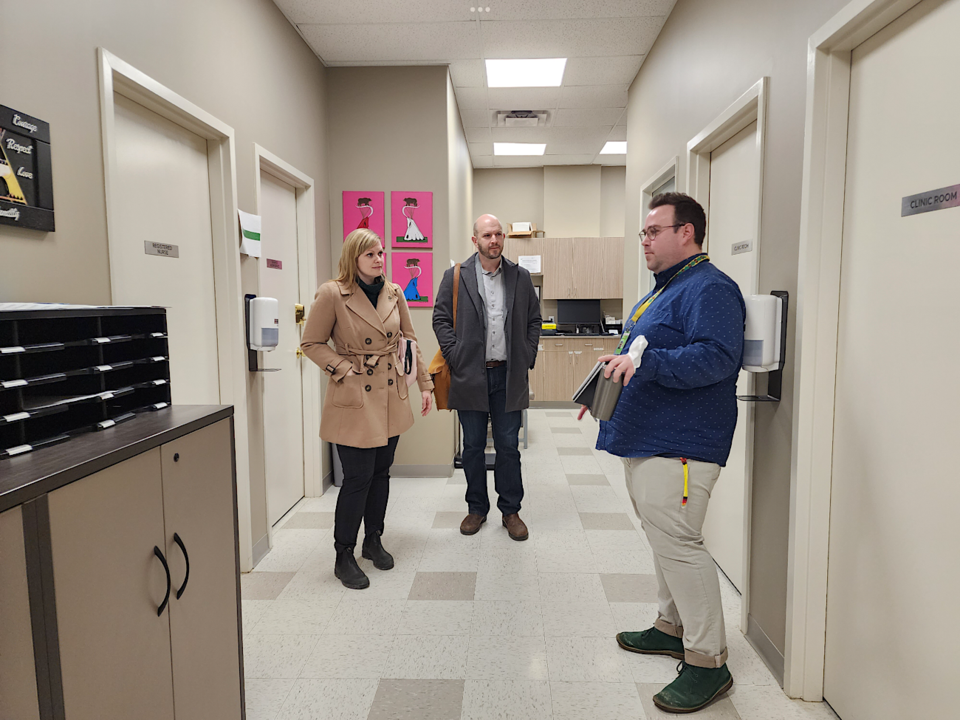NORTH BATTLEFORD - The opposition New Democrats’ health care solutions tour made its way to the Battlefords this week, seeking feedback on the health challenges facing the local community.
Opposition Health Critic Vicki Mowat and Rural and Remote Health Critic Matt Love were in North Battleford and Battleford on Wednesday. Among the stops for the critics was the Battle River Treaty 6 Health Centre for a meeting and tour there, and later in the day they made their way to the Battlefords District Care Centre for a tour of that facility. Other meetings with local health care professionals were also scheduled.
It is the continuation of a tour which Love said involves “getting out and meeting folks where they’re at, listening to those on the front lines who have that close grassroots knowledge of what’s happening in their community and what the needs are and what the potential solutions are.”
The tour had already taken the MLAs to communities such as Warman, Lanigan and Humboldt in recent days. The MLAs say they have heard familiar themes about issues such as recruiting and retaining health care workers, but also some unique local challenges as well.
During their stop at the Battle River Treaty 6 Health Centre, Love said their discussion focused on topics like access to primary care, concerns about mental health and addictions, and discussion of what they’re seeing both in the Battlefords and with the Indigenous people that they serve in the surrounding area.
The Battlefords has faced some health care challenges in the past number of months. The Primary Health Centre in the Frontier Centre mall saw the departure of three doctors at the end of last summer, resulting in disruptions for those patients. But the MLAs report the issues are more extensive than that.
Mowat said some of the staff at Battle River Treaty 6 were saying that 17 more family physicians were required in the community. As well, they heard that one of the walk-in clinics was closed, she said, with the community now down to one walk-in clinic.
The main need seemed to be for more primary care doctors, based on the feedback the MLAs were receiving. As for the Primary Health Centre, they were reporting having a hard time recruiting, said Mowat.
“We heard really good concerns about access to family doctors, access to primary care, whether it’s family doctors or nurse practitioners in the community,” said Mowat. “One fellow told us that getting a doctor here is impossible.”
Mowat said they needed to find solutions to recruiting professionals to the area, but also “making sure that health care professionals are retained when they get here.”
Mowat also continued to express concerns about the province’s recruitment strategy, which included a recent mission to the Philippines to recruit more health care professionals,
“We know by the provincial auditors investigation, we know that with the Sask Party’s plan for recruitment and retention we’re still going to be 1,000 healthcare workers short. So we need to be doing more and we need to include local voices in coming up with these solutions.”
She said the Battlefords were a hub for surrounding communities, and the province needed to look at particular programs that could use those regional hubs, rather than go into Saskatoon for every service that is needed.
Love also said there were concerns from healthcare workers that the incentives being offered by the province in recruitment of health care professionals were only being offered to new employees of the Saskatchewan Health Authority.
“I think that there’s already a feeling, I think it’s prevalent across the healthcare workforce, of feeling disrespected and undersupported by the SaskParty government,” said Love. “We know we need to see folks recruited to our workforce, but again, witnessing the lack of plan for retention.”
Talk about mental health issues also came up during the visit, with Mowat noting the impact that the staffing shortage was having in that area. She said the MLAs also heard about the “silos” between the mental health and the addictions streams.
“There is a ton of work that needs to be done in making sure people have access to counselling when they need it, making sure people have access to addiction support when they need them so that they can get the help they need.”
Some of the other feedback the MLAs had gotten in the Battlefords, said Love, was of challenges with the Saskatchewan Income Support program “really creating strain on their ability to provide care for people.”
“We’re seeing an increase in needs, an increase of unhoused people struggling to access services,” said Love. “That also creates challenges in the health sector.”
The other takeaway Love noted was that the Battlefords saw a large number of people working in healthcare.
“We heard a number of 12 per cent of their workforce working in the medical field. And I think that goes again to say how important these healthcare jobs are. These are good mortgage-paying jobs. They provide people the ability to afford life, or come close to afford in the current cost of living… Healthcare jobs are good jobs that help the local economy, so that’s one thing we heard here in the Battlefords.”
The plan for the MLAs is to keep on with the health care tour and get as many visits in as they can before the return of the spring session of the Legislature in March.
“Certainly, we will be taking the scenes that we heard on this healthcare tour and working to hold the government accountable to them,” said Mowat.
“There are a lot of very clear situations and facts that we are encountering out here that don’t match with the spin that we often hear in the House. So for us, it’s about bringing forward those stories, making sure that there is accountability and that people ultimately get access to the healthcare they need when they need it.”






